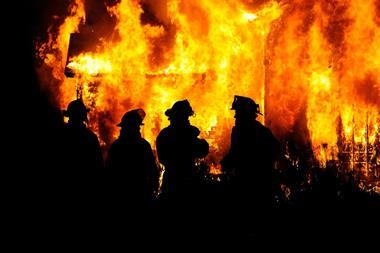This is how the judges of the 2004 Strategic Risk European risk management awards described Institute of Risk Management (IRM) in their special commendation for the IRM's new associateship (AIRM) diploma. The IRM's chairman, Ian McNeil, and executive director, Steve Fowler, talk with Lee Coppack about recent achievements and planned new projects.
Lee Coppack: Last year about this time you were launching the new associateship syllabus. How has that gone?
Steve Fowler: We've had a tremendous amount of interest. Student numbers are up about 30%.
Lee Coppack: What do you think has made the difference?
Ian McNeil: I think we're getting the message of the value of the qualification across better and to all practitioners of risk management, not just within the insurance and broking community.
Steve Fowler: I put it down to three things. One reason is that the diploma is a partnership between practitioners and academics. It's been developed by practitioners and validated by academics, so it has both practical application and academic rigour. Second, we have made it a true vocational qualification. We have increased the range of disciplines offered through alliances between the IRM and other educational organisations. For instance, we worked with the Association of Project Managers to develop our optional module on project management.
I think this is actually a metaphor for the way that risk managers should operate anyway - bringing in experts from other disciplines, understanding what they do without trying to do it all themselves.
The third reason is that we have taken the opportunity to listen to students' and employers' views of our and other organisations' previous products, and we have totally redesigned the support package for students as a result.
Lee Coppack: Was this a big issue?
Ian McNeil: When I did my AIRM, it was almost: "There are the textbooks. See you at the exams." We want to give a lot more support.
Steve Fowler: We came up with a multi-stranded approach. First, when students register, they get a comprehensive manual detailing everything they need to study and guidance on how to study which is important because many students have not studied for exams for a long time.
We're also aware of the importance of keeping the cost to students at an acceptable level. Generally, we encourage students to read the leading textbooks on a particular subject. However, if there are six books each costing £50, we might decide to commission our own to bring key content together in one place and hence reduce the cost to students.
Finally, we provide support through the web. Our web facilities enable students to talk to each other. They can also post questions to examiners using the same system. The answers are subsequently available to other students who may not have thought through the question in that way.
In the future, we might have the diploma taught face-to-face as well. This is under active consideration.
Lee Coppack: At what level is the AIRM pitched? Who takes it?
Ian McNeil: It's a post graduate certificate. There are two types of people taking it. First, there are corporate risk managers who ought to take the AIRM because it's their professional qualification. Then, there are people dealing with risk who are specialists in particular fields, so the IRM has many members who are insurance buyers, corporate governance experts, fire engineers and so on.
Steve Fowler: A project risk manager, for instance, takes it for granted that he or she will know about project management and possibly project risk management, too. The AIRM gives the broader context within which project risk management fits.
Ian McNeil: The AIRM has five core subjects based on the risk management standard and then a number of optional subjects, for instance, as Steve mentioned project risk management. We try to keep our ear to the ground, and if there is something that members want, we either try to develop a course in conjunction with an organisation that already has an educational programme in this subject or to buy one in. We're happy to buy in courses if they are suitable.
Steve Fowler: An example of a subject under development is the specialist module on captive risk management. There we're working together with leading captive domiciles to develop the course and the books.
Ian McNeil: Another idea we're working on is the creation of an academic panel. We want to get a group of academics together to monitor our syllabus constantly to ensure that we maintain a post graduate certificate level standard and that we keep pace with the risk management environment. In the past, we were criticised for not changing our syllabus and materials often enough. We don't want to say that the associateship syllabus is now complete and then do nothing more over the next ten years. It has to be a developing, 'living' process.
Steve Fowler: Another key factor is that we are a world wide organisation, so we will bring in leading academics from North America, Australasia and Europe as well as from British universities and business schools.
Lee Coppack: What will the attraction be for the academics to take part?
Ian McNeil: Risk management is a growing field and many universities are looking to introduce risk management courses, so taking part in our academic panel will be of intellectual interest.
Steve Fowler: It is also an opportunity for them to exchange ideas. In the course of developing the new associateship, we had meetings of about 30 practitioners and academics. We found that many of the academics introduced themselves to each other. Each was expert in his or her own field but they didn't have a huge amount of interchange of ideas between the separate fields. The reaction so far from academics is that they like the concept of a neutral body bringing together colleagues from completely separate areas of risk.
Lee Coppack: Is there still more to be done on the associateship? Have you got other projects underway?
Ian McNeil: Yes, we are looking to add new subjects to the associateship and texts to go with them. For instance, we are going to bring in business continuity, a module on loss management in conjunction with the Chartered Institute of Loss Adjusters, reputational risk management and captive risk management. Some of them are for the 2004-5 academic year and some for 2005-6.
Steve Fowler: Some we are developing on our own and others with educational bodies in the relevant areas. For instance, on information systems risk management we are working in partnership with the Information Systems Audit and Control Association (ISACA).
Lee Coppack: I know the education committee has also been working on short courses and possibly a certificate in risk management. What stage are they at the moment?
Ian McNeil: We are planning to hold our first short course in September. It's going to be a two day, general introduction to business risk management and is aimed at anyone who wants to get a short overview of risk management.
Lee Coppack: What other events do you have this year?
Ian McNeil: We were exceptionally lucky this year to have Sir Clive Woodward, the head coach of the England Rugby Team, give the annual lecture in May, thanks to Zurich and English Rugby and to Willis who provided the venue. So many of the things Sir Clive spoke about are relevant to the areas we deal with daily: taking risks, building partnerships, getting our teams to work at peak performance and inspiring trust.
Now, we are well underway in the planning for our next major event, our 2004 Forum which takes place from 20 to 21 September at a new venue, Keele University in Staffordshire.
Lee Coppack: Where does the Forum fit into the educational work of the IRM? What makes it different from other risk management conferences?
Ian McNeil: Students and members are very spread out geographically, with a lot of students from overseas. It's a way everyone can meet.
Steve Fowler: The Forum is a learning event, not a trade fair. We try to make it accessible to all sectors of the risk profession, from commercial organisations, public sector both local and central government and the voluntary sector. All of them are important to us. We know cost to the delegates is a key factor, so we try and price the Forum so it's accessible to all.
Ian McNeil: Using educational establishments as the venues also gives an academic feel.
Steve Fowler: People aren't there to sit and listen, so it's not a typical conference. They will be involved in the proceedings. The core of the conference this year is the 50-60 workshops and master classes in which people participate actively.
Lee Coppack: What are your hopes for the Forum this year?
Ian McNeil: One of the most important things is that the membership sees that the Forum has a wide risk focus. We've put together a top programme and we want people to go back to their own organisations and spread the word. It is about trying to raise the profile of the risk manager within the organisation. Even some major companies still see the risk manager as someone in a grey suit who buys insurance.
Steve Fowler: We provide a service to risk managers in trying to raise their sights and status - and so their income - by improving their professional standing.
Ian McNeil: We enable them to go back to their company and help manage other stakeholders' expectations and report to the board.
Lee Coppack: What about the investment community? The combined code of corporate governance draws attention to the importance of risk management. Are you finding investors and analysts taking an interest?
Ian McNeil: Not very much so far. They tend to focus their attention on financial risk.
Steve Fowler: It ought to change. If you talk about major projects, for example, you only have to look at the amount of capital investment that is at risk if there is a catastrophe. A lot of the Forum is about raising the sights of risk managers and risk practitioners so they can influence major decisions within their organisations.

















